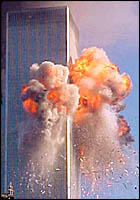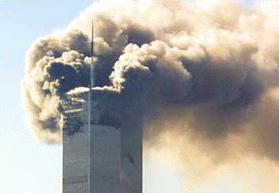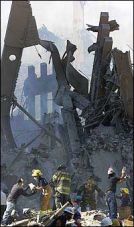 ~ ~ ~ ~
A Dark Theory Behind Black Tuesday
Stephen Marshall: Hello Mike. First
question I guess… what was your initial reaction to the images being broadcast
from New York on Tuesday and what were your first thoughts regarding the
coverage.
Michael Ruppert: From the moment
it happened we began hearing the name Osama
bin Laden and there is an enormous body of evidence building already
that Osama bin Laden is not and was not capable of pulling this off by
himself. Period.
Historically, it is extremely well
documented that Osama bin Laden is and was a creation of the Central Intelligence
Agency in the 1980's when he joined with Mujahedeen Freedom fighters in
Afghanistan. He worked with Gulbadin
Hekmatyar who was running six heroin factories under CIA protection
in Pakistan and Afghanistan. As recently as 1996, the U.S. government had
secret agreements with the government of Sudan to allow him sanctuary there
for the purposes of monitoring him. In 1997-1998 after the cruise missile
attacks on the El
Shifa pharmaceutical factory, which were absolute disasters for the
U.S. because no weapons were made there. The U.S. intelligence community
had ample ability to know and to track his movements. I have just learned
that from 1998, Reuters is reporting, that a green light was given for
covert operations against bin Laden and when you couple this with the fact
that we know now, from European reports from Germany, France and Israel,
that advance warning had been given to the U.S. government of an imminent
attack, the current U.S. government position on this is really not sustainable.
So let me get this straight. Because
you have been really clear in our past conversations about the murky world
of intelligence communities and the whole business of war. And you have
discussed the fact that there is always some group or faction that benefits
directly from an armed conflict. But are you saying that, even in this
case, with the horrific damage done not only to the financial center of
New York and the United States, but also to the psychological well-being
of the American population, that some faction of the U.S. government had
foreknowledge of these attacks?
I absolutely believe, at this
moment, that the United States government had foreknowledge of the attacks
and allowed them to occur.
OK. So then please explain who
would have directly benefited from his tragedy and how will the ensuing
domino effect of military escalation play into the hands or interests of
those people?
First of all, just two days before
the attack, on September 9, I issued an urgent
bulletin to all of my subscribers indicating a pending economic collapse
of unbelievable proportions. Based upon what I had already predicted and
what was already occurring, a rapid deflation of the Dow,
having lost 900 points in three weeks before the attack. And two other
factors, one of which is an artificially suppressed gold price which is,
according to a suit filed in Boston by GATA
- the Gold Anti-Trust Action Committee - a design by the U.S. Treasury
and major banks to keep gold prices low so that investor confidence would
stay high but also because gold, physical gold, had been leveraged forward
in multiples to an amount many times greater on paper than there is gold
in actual existence. This is a suit that was threatening to come to the
surface. Historically, investor confidence is gauged, is pegged to gold
because if gold prices remain low, investors will assume no inflation and
healthy markets. The minute gold prices rise, investor confidence sinks.
And this has been an artificial ploy by the U.S. government which surfaced
actually and was exposed in 1998 with the collapse of a company called
Long
Term Capital Management which almost toppled the U.S. economy and forced
the Federal Reserve and the U.S. Treasury to intervene, exposing artificial
manipulation of gold prices.
The second economic bomb that was
ready to go off and which I warned about on Sept 9 was a 30 trillion dollar
derivatives bubble spearheaded by JP Morgan-Chase (JPM)
and 30 trillion would have collapsed the economy. Basically, the simplest
form of derivative is a stock option where you can buy an option to purchase
a share of stock trading at $80 for $1 and you can tie up trillions of
dollars with little amounts of money. But if the economy fails you then
become liable for the trillions of dollars that you have tied up. Excellent
posts on this issue were placed at a website called lemetropolecafe.com
that I strongly recommend people look at. And what I had said on September
9 was, 'look, this is going down and we're all going to burn.' And that
was two days before the attack.
Now, given the fact that the economic
indicators were for a recession, if not depression, by the end of October
(for which the US government and Wall Street would have had to have taken
responsibility), the now certain global recession that will follow the
World Trade Center attacks, now has someone convenient to blame it on.
Right. Got it. Now I wanted to
push this over to another focus of emphasis, namely the Bush Administration
and his stacked line-up of advisors who are veterans of the business of
war. Cheney, Powell, Rumsfeld and even Condoleezza Rice. This seems to
be a very professionally managed media campaign. In fact, many of the first
people to appear on the networks after the attack were right out of George
Bush Sr.'s cabinet.
What kind of public consensus
are they trying to mould? What do you see as their next course of action
and how will that alleviate the imminent economic collapse you have described?
Well, to answer the last question
first, most Americans who subscribe to the government line will believe
that the economic impacts of this were the result of someone else's wrongdoing
rather than wrongdoing that originated in the United States and on Wall
Street and in Washington. So, there is somebody to blame. It will focus
attention. It will, in a sense, psychologically condition people to hardships
that are very certain to come. And I can not emphasize strongly enough
that the American people have not even begun to grasp the economic impacts
of what is happening.
Do you mean economic impacts that
are a direct result of the attack on the World Trade Center or those that
were already being felt as tremors in the markets over the past few months?
I mean the attacks. The markets
of the world are going to respond to this. America will never be viewed
as a safe haven for capital again. At least, as safe as it was. In addition,
if there are subsequent attacks, which I consider to be likely at this
point. I give a 51% probability that there will be additional terrorist
attacks. Confidence in the United States as a safe place to put capital
will be further diminished, which will result in capital flight. But there
is a domino cascade effect from this in that the international markets
which were already in recession if not depression - Japan
being the first that comes to mind, having reached new lows in their stock
market prior to the bombing - were looking to the United States for continued
orders of consumer imports to sustain their economies. Consumer confidence
in the U.S. is wiped out. Wall Street, before the bombings was pointing
to consumer confidence as the one thing that would keep Wall Street from
absolutely tanking. Well, that whole issue has been turned upside down.
So I think that in the short term you'll see massive movements by central
banks around the world to make everything look normal. But it cannot last.
You will see gold
prices eventually soar. You will see investments in U.S. markets diminish
and the other markets around the world who are over, if not at the precipice,
will definitely be way over it now.
OK. Let me change tack again and
ask you this. For most of the people watching the news and following all
of the intelligence coming out of the Pentagon, this attack was the product
of a deep hatred for Americans by so-called religious zealot. Who acts
on behalf of a foreign people who live in a distant land and who have different
values than us. That's the official story. But you are here telling us
that it is actually all linked to an imminent economic collapse. How do
we reconcile these two explanations? Do we have to extend our understanding
of this to a broader perspective that is a nexus of the two or are we being
fed this line about the attacks being a product of the jihad or religious
war?
How would you explain it to a
classroom of students who might ask, what does this economic collapse have
to do with a bunch of religious fanatics living in Afghanistan?
Let's take a look at one historical
model that we absolutely know. Anyone who's watched the History
Channel in the last year as seen the revelations
that the United States had broken the Japanese code and knew that the Japanese
were going to attack Pearl Harbor well before it occurred. The historical
paradigm prior to that is in the 20's and 30's, the U.S. and the British
had been closing Japan off from its access to oil from Indonesia, Malaysia,
South East Asia and everything else. In other words, economically, Japan
had been backed into a corner. We knew that the Japanese were going to
attack - and the History Channel has eyeball witnesses and US government
documents, this is out of the bag now - and yet because it suited political
and economic and social purposes to bring the US into World War II, we
allowed it to happen. And I think we need to learn from that lesson.
And I need to make something else
very clear here. I'm an ex-cop, and you know that. I watched the firemen
and the policemen in New York and I wept. Because that is who I am and
what I am and that's America. What America is not is what has been done
around the world to cause enormous anger at the United States, whether
it be the genocide of 2 million people in Rwanda
for U.S. economic interest. The attacks in Kosovo which have left large
portions of that landscape radioactive
for a million years. The radioactivity
and D.U.
and leukemia
in Iraq that is there from ten times the amount of depleted uranium. The
million displaced
persons in Colombia, the genocides
in East Timor. All of these are related to U.S. foreign and economic policy
and there are a lot of people in the world who do not like us and, you
know what, they have good reason. And that's not to justify these attacks.
You know, we create the enemies
and, in this particular case I suspect investigation by my self and others
will bear this out, the United States government knew about these attacks
well in advance and may have even encouraged them quietly or from acts
of silence.
Two quickies. How would you characterize
the media coverage thus far and how do you expect it to run as this thing
expands into a large-scale conflict?
The media coverage is in lock-step
with Desert
Storm and every other major government operation of the last two decades.
I've seen little critical thinking on the part of the major media. Most
of the critical thinking is coming from… and we are having an impact from
the alternative media in terms of influencing some of the stuff that's
getting on the air; questioning bin Laden's roots, connections to the CIA
and so forth. True.
There's a lot more stuff that the
major media could be doing that they are not.
OK. Last question. This may verge
a bit onto the side of conspiracy theory but here goes: As I watched the
initial broadcasts after the attack and saw the steady stream of Bush advisors,
and his cabinet members... they just seem so at home with it all. And then
I stopped for a second and tried to visualize Gore in the middle of this.
And I couldn't. It's like he was never meant to get to this point. And
then I thought back to the election and all of that. I guess what I am
saying is that this whole thing just smacks of a certain character, a very
Bush-like international terrorism, middle-east-crisis type thing. You know
what I am getting at?
Well my take on it is that this
economic crisis would have been here no matter who was President. I think
that what we're seeing, though, is a trademark Bush conservative war-oriented
approach which is the way that the Bush faction would traditionally respond
to this crisis.
Deep cover. Deep politics, right?
You got it.
Thanks for your time Mike.
You're welcome, Steve.
Home~ ~ ~
|
 ~
~ ~
~